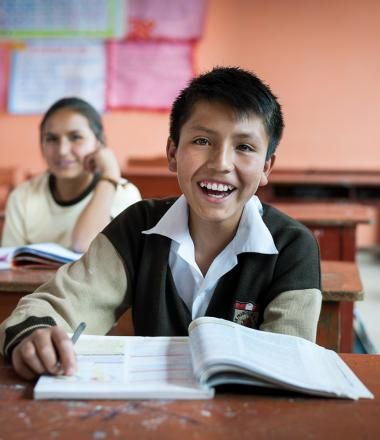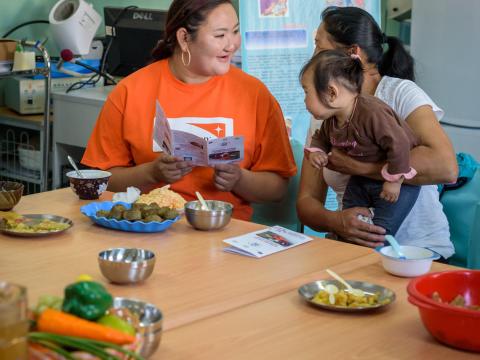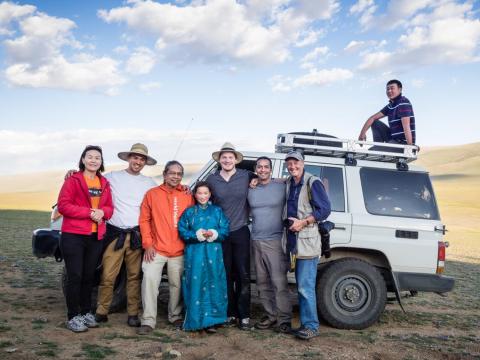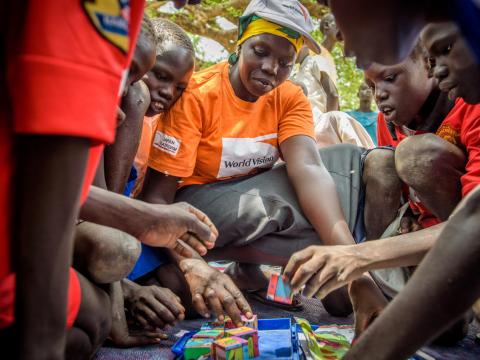
Frequently Asked Questions
Do you have questions about World Vision?
Read through our frequently asked questions below or contact us to find out more.

Our Identity
What is World Vision?
World Vision is a global Christian relief, development and advocacy organisation dedicated to working with children, families and communities to overcome poverty and injustice.

Our Work
What types of projects does World Vision do?
World Vision projects may be grouped into three areas:
- short-term emergency relief, such as providing food, shelter and medical care to survivors of natural or manmade disasters;
- long-term

Our Faith
Is World Vision a Christian organisation?
World Vision is an independent private Christian organisation that holds faith in Jesus Christ as central to our identity, motivation and calling to serve communities in need and in crisis.
We are a
Frequently Asked Questions
What does "child-focused" mean?
Children are the most vulnerable members of any community, so World Vision project activities are designed to have maximum benefit for them. This means improving the lives of children by dealing with the causes of their suffering, not just the symptoms. It also means recognising that children live in a larger context of family and community, so sustainable development work needs to impact all of these.
Who started World Vision? How did World Vision begin?
World Vision was founded in 1950 by Bob Pierce in response to the needs of Korean War orphans. Introduced by a Chinese missionary to a beaten, impoverished child, Pierce gave the missionary his last $5 to help with her care and promised to send more when he returned home to the United States.
How is World Vision funded?
World Vision receives a majority of its funding from individuals, foundations and corporations. Such private funding accounts for 63% of World Vision’s operating budget, with the rest coming from multilateral agencies and governments. While World Vision relies heavily on funds raised by its Partnership offices throughout the world, communities receiving assistance always contribute to their own development projects and have a real sense of ownership and true participation. Community involvement is integral to transformational development.
Is World Vision a non-governmental organisation?
World Vision is not formally affiliated with any government, denomination, foundation or corporation, though it maintains positive working relationships with all of these. Because of this independent status, World Vision does meet the standard definition of a non-governmental organisation.
How does World Vision help children?
Child sponsorship is an effective and fulfilling way to help give a child from a vulnerable community the chance of a brighter future.
In order to thrive, children need to grow up in an environment that provides the essentials they need today along with hope and opportunities for tomorrow. Children need to enjoy good health and be cared for and protected. They need to be educated for life, be welcomed to participate in decisions that affect their lives and be free to choose to love God and their neighbours. Sponsors’ contributions fund vital development work in their sponsored child’s community, which over time results in a significant improvement in the children’s well-being.
World Vision works with community groups and the children themselves to plan and carry out changes so that more children will gain opportunities to fulfil their potential in life. Sponsors witness these changes through progress reports from the community and personal communication with their sponsored children. Sponsors can encourage the child they sponsor by writing or even visiting their sponsored child and his or her family.
By combining the donations given by many sponsors in a project area, World Vision works with a large community for an extended period – typically 15 years. This helps to achieve legitimate development objectives chosen by the community that will benefit sponsored children, their peers, all their families and the whole population. Typically, these activities relate to quality education, health, nutrition, and clean water.
At its heart child sponsorship is a relationship-building tool. The community, the organisation and the sponsors all have opportunities for growth as they unite in the struggle to identify and deal with the effects and deeper causes of poverty.
Is World Vision formally tied to or a subsidiary of any other entity?
World Vision is an independent private Christian organisation and is not formally affiliated with any government, denomination, foundation or corporation, though it maintains positive working relationships with all of these.
Does World Vision share the gospel or evangelise in its projects?
World Vision does not proselytise. The organisation does not demand that people hear any religious message or convert to Christianity before, during, or after receiving assistance. Educational activities based on Christian values may occasionally be included in World Vision projects if appropriate and desired by the community. However, World Vision respects the religious beliefs and practices in countries where it operates and seeks mutual understanding with people of all faiths. Whenever appropriate, World Vision works in partnership with local churches and other faith-based organisations in an effort to work inclusively and collaboratively within existing community structures. Our focus is to respond to human need, and our compassion and professionalism reflect our faith.
Do people living in project communities contribute to World Vision projects?
Communities always contribute to development projects and have a real sense of ownership and true participation. Community participation is integral to transformational development.
Do World Vision projects create dependence on outside resources?
No. Community development projects are designed to be sustainable with locally available resources, technology, materials, and leadership. Families and individuals share in project leadership, responsibilities, and activities from the start. They are well equipped and motivated to continue in these roles when World Vision ends its direct involvement in a community.
What is World Vision International?
World Vision International (WVI) is the entity that provides global coordination and oversight for the organisation’s programmes. WVI was established in 1977 to strategically coordinate and ensure consistent operating policies and standards globally across all Partnership offices.
What percentage of World Vision donations go to children and others receiving relief?
Children are the most vulnerable members of any community, so World Vision project activities are designed to have maximum benefit for them. In recent years, 86% of total funds raised were distributed into programmes that directly benefit children and families.
At World Vision we use the phrase ‘child focused’ to signify an emphasis on improving the lives of children by dealing with the causes of their suffering, not just the symptoms. It also means recognising that children live in a larger context of family and community, so sustainable development work needs to impact all of these.
For example, if children are hungry in a community, World Vision aims to resolve the underlying food insecurity issues affecting the community by investing in projects like improved irrigation systems, seeds, and training. Using this approach, children get the food they need – not just for this year, but sustainably into the future.
Microfinance and other projects that seek to improve adults’ livelihoods are a large part of this child-focused strategy. An economically stable community can care for its children long after development projects have come to fruition. When World Vision leaves a community, it is able to independently sustain itself.
